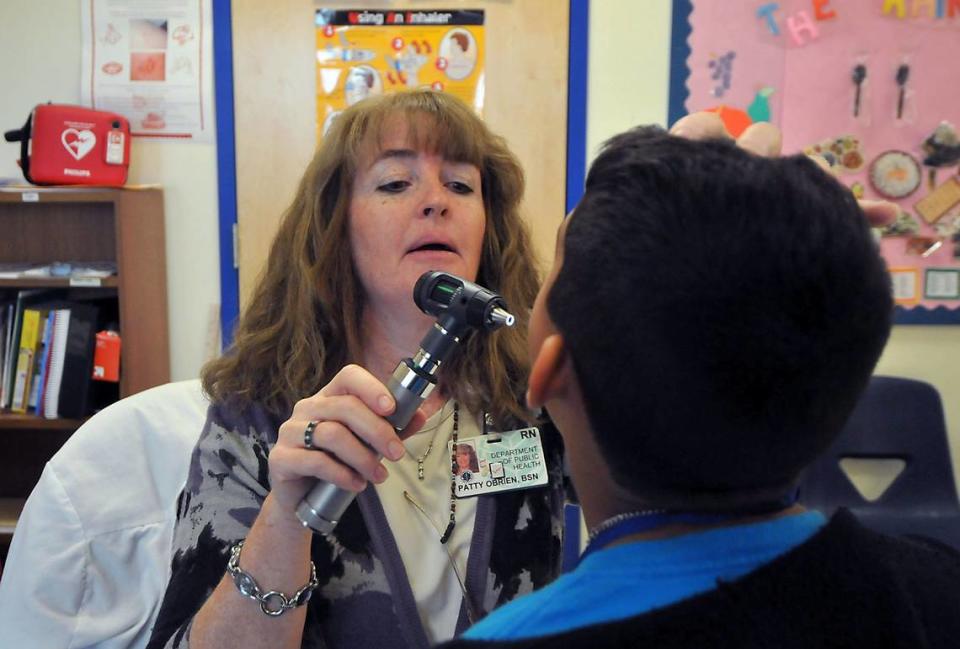CMS is short dozens of nurses. New hires could get thousands of dollars to ‘close the gap’
Thousands of dollars in sign-on bonuses and college scholarships will help get more nurses in Charlotte-Mecklenburg Schools, county officials say.
Under Operation Nurse in Every School (NIES), presented this week to Mecklenburg County commissioners, public health nurses could get anywhere from $3,000 to $10,000 in sign-on bonuses depending on the degrees they’ve attained. The incentives would be distributed at their hire and completion of their first year. It would require a two-year employment commitment.
Angela Lee, Mecklenburg County assistant director for preventative health, says they’re finalizing plans for scholarships to the University of North Carolina-Charlotte and for Northeastern University-Charlotte nursing students. County staff are talking to Central Piedmont Community college about other ways to increase the nurse pipeline and talking about ways to promote retention.
“This is our commitment to the professional standards of excellence that provide excellent care to our students,” Lee said.

CMS has too many vacancies
Mecklenburg County provides 126 full-time and 17 part-time school nurses to CMS, county Health Director Raynard Washington told The Charlotte Observer. Washington says there are more than 50 full-time nurse vacancies in school health, and the program vacancy rate stays around 30%. It’s been a prevalent issue since 2013 when they added 36 positions.
“We need to close the gap,” Washington said.
CMS spokesperson Vicki Grooms told the Observer schools must identify at least two first responders who are trained and certified in first aid and CPR when a building has to go without a nurse for any amount of time.
“Even if they have a nurse in the building, they can’t guarantee they are available for every situation,” Grooms said. “So the first responders are trained to support and assist. If a student is sick at school and the nurse is not available, there are staff trained to help administer medications and support.”
If the nurse is not in the building, “the staff in the school are left to help with minor bumps or bruises and call parents for more serious illnesses or injuries,” Grooms said.
Challenges outside of Charlotte, too
Washington says Mecklenburg County faces national and local challenges when it comes to finding and keeping school nurses.
Nationally, there is a school nursing shortage, and 27% of nurses leave their jobs per year, according to data presented to commissioners. There’s also a decline in nursing program enrollment. Of those enrolled in nursing programs, 67% are on track for an associate degree.
About 7,000 people enrolled in North Carolina pre-licensure programs in 2020, down about 3,000 applicants from the previous two years, according to a report from the North Carolina Board of Nursing.
County Commissioner Arthur Griffin Jr. serves as a trustee at Central Piedmont and said students often have difficulty passing the test to get into the registered nurse track at the community college.
“Have we ever thought about in addition to these wonderful solutions we work with our hospitals and have nursing clubs or nursing activities so the younger students can understand early on what it takes?” Griffin asked during a presentation to commissioners this week
Lee said she liked Griffin’s idea. If the problem isn’t fixed, it could lead to the county’s inability to meet its community commitment to place a full-time nurse in each school. Fewer school nurses also means an increased workload and stress on those who are in the field, resulting in lower job satisfaction.
This “further threatens our workforce,” Lee said.
There’s also a potential for poorer health outcomes.
Another problem facing Mecklenburg County: competition. Area hospitals may have a sweeter deal that what the county’s proposed so far.
Area hospitals are offering up to $20,000 sign-on bonuses, $7,500 in relocation assistance, tuition reimbursement and flexibility to study for advanced degrees, according to the county’s presentation.
Bill on CMS wishlist
CMS school board members, as part of their legislative agenda, asked for ways to minimize school nurse vacancies in January.
Mecklenburg Reps. John Bradford, a Republican, Carla Cunningham, a Democrat, and Tricia Cotham, who says she plans to change from Democrat to Republican, are three of four primary sponsors of House Bill 382 that would allow non-certified registered nurses who have at least two years of experience in a hospital or health clinic to serve as school nurses.
The N.C. House unanimously passed the bill last week, the News & Observer reported, and is awaiting the Senate’s approval. The bill has bipartisan support and would provide students greater access to school nurses.
“This would basically expand the types of nurses that can work as employees in our schools,” Bradford told the News & Observer. Bradford said nationally certified nurses are typically those who have a bachelor’s degree. He said the bill would open up eligibility to nurses who have two-year degrees and three-year diplomas.

